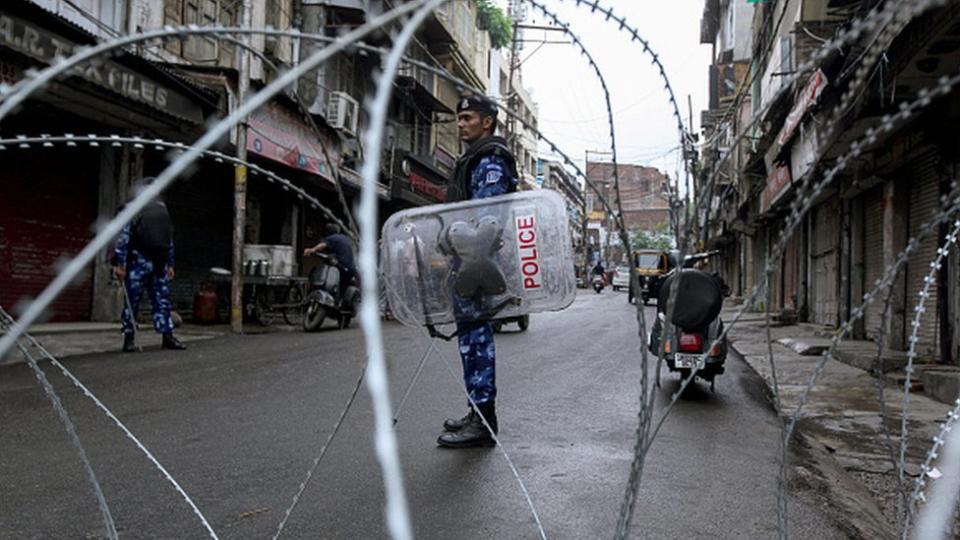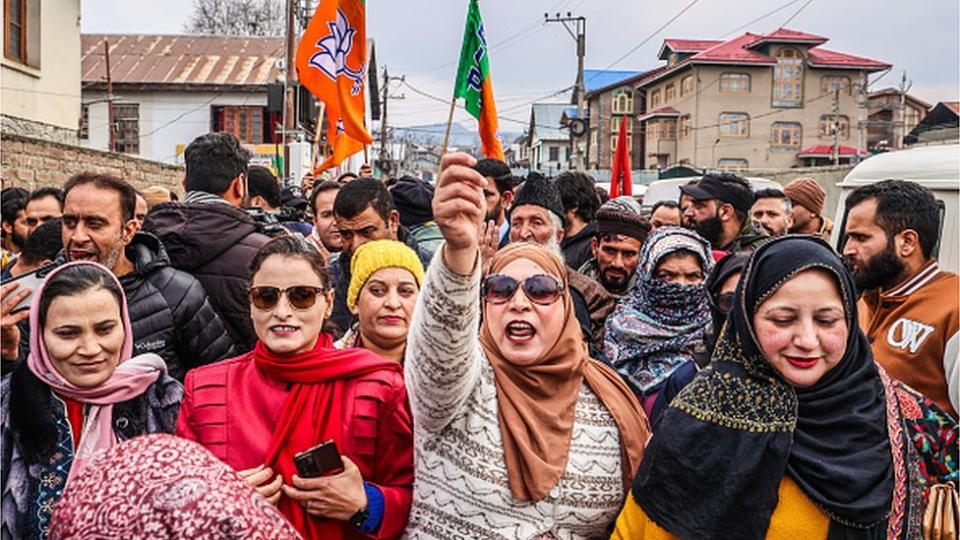More than four years after the ruling Bharatiya Janata Party (BJP) ended the special status of Indian-administered Kashmir, the party has decided not to contest this year’s general elections in that country.
Political analysts and opposition leaders say the decision suggests anger in the region over the measure – and recognition of it by the party.
Relations between Kashmir and Delhi have been tense for decades. An insurgency against Indian rule and military actions against it have claimed thousands of lives in the Himalayan region over the past three decades.
The situation worsened in 2019, when the Prime Minister Narendra Modithe government revoked almost all of Article 370 – a part of the Indian constitution that gave significant autonomy to the region – and divided it into two federally administered territories: Ladakh, Jammu and Kashmir.
The government also imposed a strict communications blockade and detained hundreds of political leaders, including three former chief ministers, for months.
Since then, Modi and his ministers have repeatedly defended the 2019 decision, claiming it brought peace to the region.
In recent years, local BJP leaders have also worked extensively to expand their support base in Kashmir by launching door-to-door campaigns.
Thus, the party’s decision not to field any candidates in the ongoing general elections – the first in the region since the abrogation of Article 370 – came as a surprise to many. (The BJP has candidates in two seats in Hindu-majority Jammu, but none in the three seats in Muslim-majority Kashmir Valley.)
The BJP’s chief spokesperson in Jammu and Kashmir claims that elections are not a priority and that its main objective is to win the “hearts of the people”.
“It took us 75 years to fully integrate Kashmir with the rest of the country and we don’t want [to create] the impression that we did this exercise just to win seats,” said Sunil Seth.
But critics say this is because the party leadership realizes that securing victory in the region would not have been easy.
While the “achievement” may be sold in other states, the removal of the Himalayan region’s special status has not gone down well with people here, says Noor Ahmad Baba, a political analyst.

Opposition leaders also allege that Modi’s party wanted to prevent the elections from turning into a referendum on his 2019 decision.
“If people were happy with the abrogation of Article 370, the BJP would not have hesitated to fight,” says Omar Abdullah, former chief minister of the region and member of the National Conference (NC) party.
“But they don’t want to expose themselves and, to save face, they decided not to contest.”
Voting in Jammu and Kashmir is being held in five phases. Apart from Abdullah’s NC, those in the fray include the People’s Democratic Party (PDP), the People’s Conference (PC) and the Apni Party of Jammu and Kashmir. The Congress, India’s main opposition party, is also contesting it.
NC and PDP leaders have repeatedly claimed that the BJP is supporting the CP and Apni Party in the elections and called them their “proxies”.
The BJP has not made any formal announcement about an alliance. But BJP sources told the BBC that it would extend its support to some parties that have strongholds in north and central Kashmir. Last month, the party’s regional chief Ravinder Raina said they would support “like-minded parties”.
The party’s decision to cede ground caught many of its local members off guard, who say they have been preparing for the elections since 2019.
“We were going door to door, meeting people and telling them about the work done by the government,” said Shabir Ahmad Zargar, a BJP worker from Kupwara district in north Kashmir.
“We are disappointed but we have to accept the party’s decision,” adds Fida Hussain, another party worker from Baramulla district in north Kashmir.


The move is also surprising because this is the first time that the BJP has not contested general elections in the region since 1996.
The party has traditionally not enjoyed much support here, but experts say its cadre base has increased in recent years.
Its best performance was in the 2016 state elections when it emerged as the second largest party and formed government with the PDP. The party won 25 of the total 87 seats – all in Jammu.
This marked the final legislative elections held in the former state. The coalition collapsed in 2018 and Modi’s government imposed direct rule in the region.
The party received a boost in 2020 after winning local elections, including three seats in Kashmir.
Two years later, the government redrew the assembly seat boundaries so that Jammu received six additional seats, while Kashmir received one extra seat, bringing the number to 90. (Till 2019, Jammu had 37 seats and Kashmir 46).
The exercise was widely seen as a move to increase the influence of Hindus in electoral politics in the region.
But despite some electoral success, experts say the BJP has failed to create an impact on the ground.
“The region has been under the direct control of Delhi. But people prefer a democratically elected government, where they are linked to the leadership,” says Baba, the analyst.
Local residents and opposition leaders say several other factors have also increased the feeling of alienation among people. This includes high unemployment rates, a lack of local representation in politics and alleged human rights abuses by security forces.
“Even if they won all the seats in the rest of the country, losing to Kashmir would have been a big defeat,” says Mohit Bhan, PDP spokesperson.
“To prevent them from choosing not to present any candidate”, he states.





































